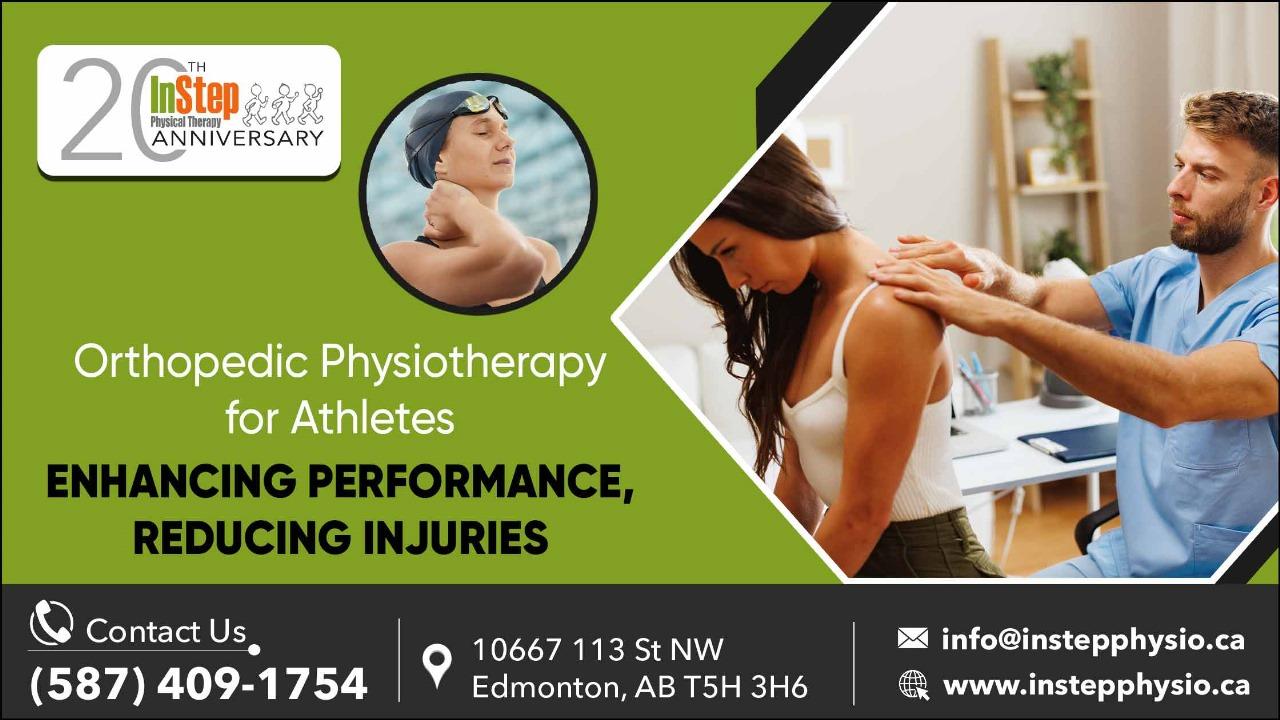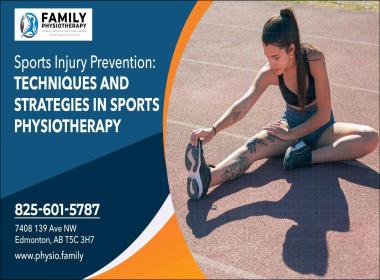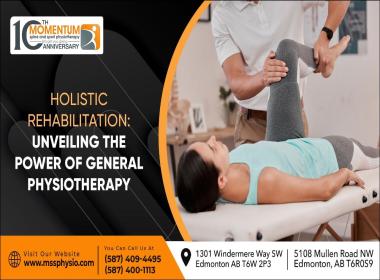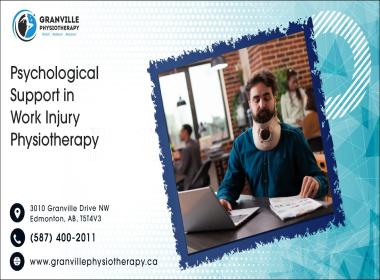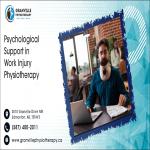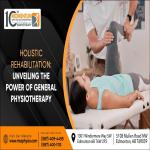Athletics demands peak performance, pushing the body to its maximum limits. While this drive for excellence brings numerous accolades, it also heightens the risk of injuries. Enter orthopedic physiotherapy a specialized branch tailored for musculoskeletal conditions. Particularly for athletes, orthopedic physiotherapy serves as a dual sword enhancing athletic prowess while mitigating injury risks. This article dives into the heart of this discipline, especially within the vibrant realm of Orthopedic Physiotherapy Edmonton.
Grasping the Role of Orthopedic Physiotherapy in Athletics
Orthopedic physiotherapy specializes in addressing, managing, and averting musculoskeletal challenges. Athletes can benefit immensely from this therapy as it dives deep into their bodily biomechanics, pinpointing both their assets and areas of potential concern.
In the bustling hub of Athletic Physiotherapy Edmonton, there's a palpable buzz. From elite professionals to budding sportspersons, there's a growing recognition of the benefits orthopedic physiotherapy brings to the table.
Boosting Athletic Performace
While sheer power and swiftness are integral to athletic prowess, the essence of top-tier performance lies in masterful biomechanics and movement dynamics. Specialists employ tactile techniques, movement education, and state-of-the-art tools to achieve the following:
Masterful Movement Dynamics: Orthopedic physiotherapy's core objective is to streamline how athletes move. Through meticulous biomechanical evaluations and rectifications, therapists empower athletes with movement strategies that are both high-performing and gentle on the physique.
Bolstering Muscular Fortitude: Tailored workouts focus on reinforcing weaker muscle factions while also amplifying stamina essential for endurance sports.
Optimize Flexibility: Maintaining a balance between strength and flexibility is crucial. Stretching routines and mobilization techniques ensure athletes remain agile and less prone to strains.
Customized Training Programs: Every sport and athlete is unique. Athletic physiotherapy offers bespoke training programs grounded in orthopedic principles. These are crafted after comprehensive assessments, ensuring athletes train smarter, not just harder.
Dynamic Balance and Coordination Training: Balance is key in almost every sport. Through targeted exercises, orthopedic physiotherapy helps athletes improve their proprioception (sense of body position), enhancing their ability to respond to dynamic challenges during competitions.
Proactive Injury Prevention
A stitch in time saves nine, they say, and this holds exceptionally true in athletic orthopedic physiotherapy. Preventive measures include:
Detailed Musculoskeletal Examination: This in-depth probe into an athlete's structural framework encompassing muscles, bones, and connective tissues illuminates potential frailties or imbalances that might be injury precursors.
Analyzing Movement Mechanics: This evaluation, focusing on activities like sprinting, leaping, or hurling, allows therapists to spot and recalibrate any movement inefficiencies, mitigating injury risks and optimizing output.
Preventative Strategies: Armed with this knowledge, physiotherapists develop proactive strategies. These might include strengthening vulnerable areas, improving flexibility, or recommending specific equipment adjustments.
Guidance on Protective Regimens: Many athletes inadvertently adopt practices that might be detrimental in the long run. Orthopedic professionals impart vital knowledge, advising on protective training methodologies, effective warm-up routines, and the significance of comprehensive recuperation.
Training the Neural-Muscle Nexus: Enhancing an athlete's dexterity, equilibrium, and body awareness can dramatically refine their athletic movements, diminishing the chances of blunders that may culminate in injuries.
Early Intervention: At the first sign of discomfort or pain, orthopedic physiotherapy jumps into action. By addressing minor issues before they escalate, they prevent more serious injuries down the line.
Athletic Conditions Treated with Orthopedic Physiotherapy
Orthopedic physiotherapy targets musculoskeletal issues stemming from injuries, strains, surgeries, or degenerative conditions. Here are some athletic conditions that orthopedic physiotherapy addresses:
Sprains and Strains: These encompass undue stretching or ruptures of ligaments (sprains) and muscular or tendinous injuries (strains). In their therapeutic arsenal, physiotherapists employ a blend of rest, cold and hot therapies (RICE), hands-on manipulation, and tailored exercises to both address and stave off such setbacks.
Tendonitis and Overuse Injuries: Repetitive movements in sports often lead to inflammation and pain in the tendons, known as tendonitis. Orthopedic physiotherapy offers therapeutic exercises, ultrasound treatments, and advice on activity modification to manage these conditions.
Fractures and Dislocations: Post-fracture or dislocation rehabilitation is essential for restoring normal function, strength, and mobility. Customized therapy regimens help athletes regain their prior performance levels safely.
Post-surgical Rehabilitation: Athletes undergoing surgeries for ACL tears, meniscus injuries, or rotator cuff repairs, among others, benefit significantly from post-operative orthopedic physiotherapy, which aids in speeding recovery and ensuring optimal outcomes.
Shin Splints: Common among runners, shin splints cause pain along the shin bone. Orthopedic interventions focus on pain relief, biomechanical assessments, footwear advice, and calf-strengthening exercises.
Tennis or Golfer's Elbow: Lateral and medial epicondylitis result from overusing forearm muscles in repetitive activities. Physiotherapy treatments include manual therapy, bracing, and specific exercises to alleviate symptoms.
Plantar Fasciitis: Athletes, especially runners, may experience this painful condition affecting the foot's arch. Orthopedic physiotherapy offers stretching exercises, massage, and orthotics recommendations.
Achilles Tendonitis: Inflammation of the Achilles tendon severely limits an athlete's capabilities. Treatment encompasses calf strengthening, footwear modifications, and, in some cases, shock wave therapy.
Back and Neck Pain: Whether due to muscle imbalances, poor posture, or direct trauma, orthopedic physiotherapy addresses these pervasive issues through core strengthening, flexibility exercises, and manual therapy.
The Recovery Route: Rehabilitation After Injuries
Rehabilitation following injuries is a crucial step in the athlete's path to regaining optimal functionality and strength. Leveraging orthopedic physiotherapy, the rehabilitation process involves a blend of tailored exercises, manual therapy techniques, and education to restore movement, alleviate pain, and rebuild muscle strength.
Beyond just physical healing, the rehabilitation journey holistically addresses the athlete's emotional and psychological well-being, ensuring a comprehensive return to peak performance. This process not only focuses on immediate injury but also on equipping athletes with knowledge and strategies to prevent future setbacks.
Conclusion
Orthopedic physiotherapy is no longer just an adjunct service for athletes; it's a critical component of modern athletic training. Focusing on the entire musculoskeletal system, In Step Physical Therapy Edmonton offers athletes a comprehensive solution from maximizing performance to minimizing downtime due to injuries. As Edmonton continues to position itself as a hub for athletic excellence, the role of orthopedic physiotherapy stands tall, ensuring our athletes remain at the peak of their game.
Also read about:
Sports Injury Prevention Techniques and Strategies in Sports Physiotherapy
Holistic Rehabilitation Unveiling the Power of General Physiotherapy
Psychological Support in Work Injury Physiotherapy
